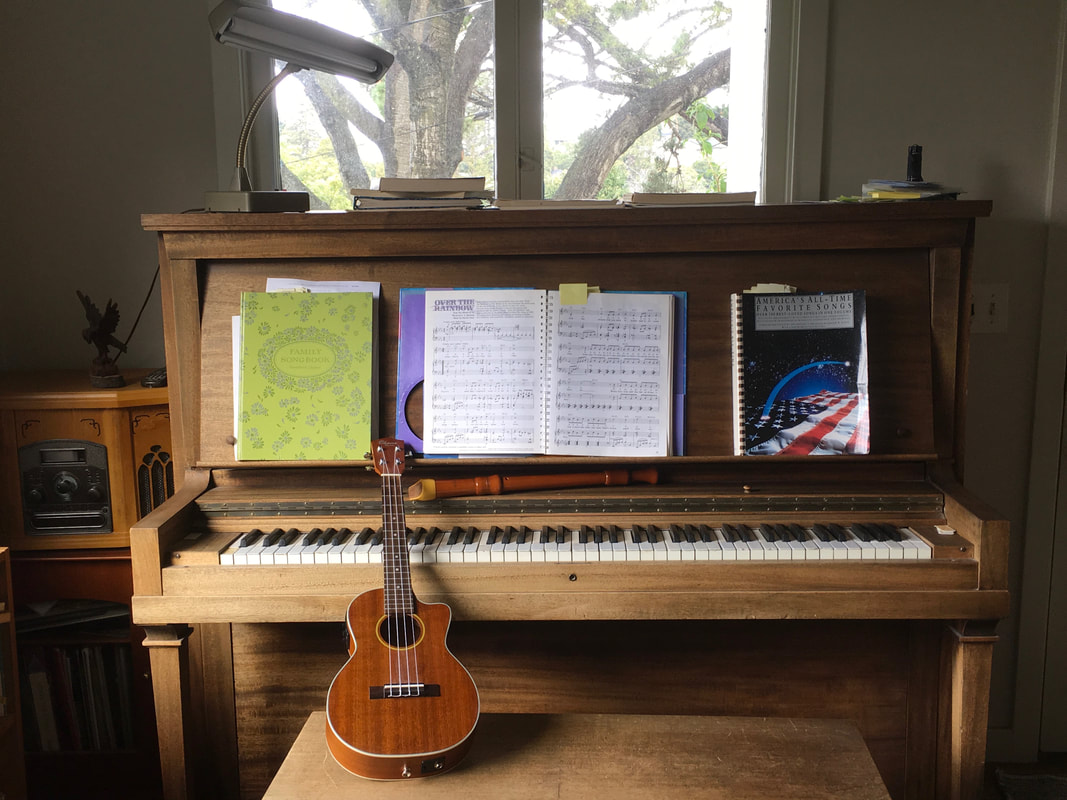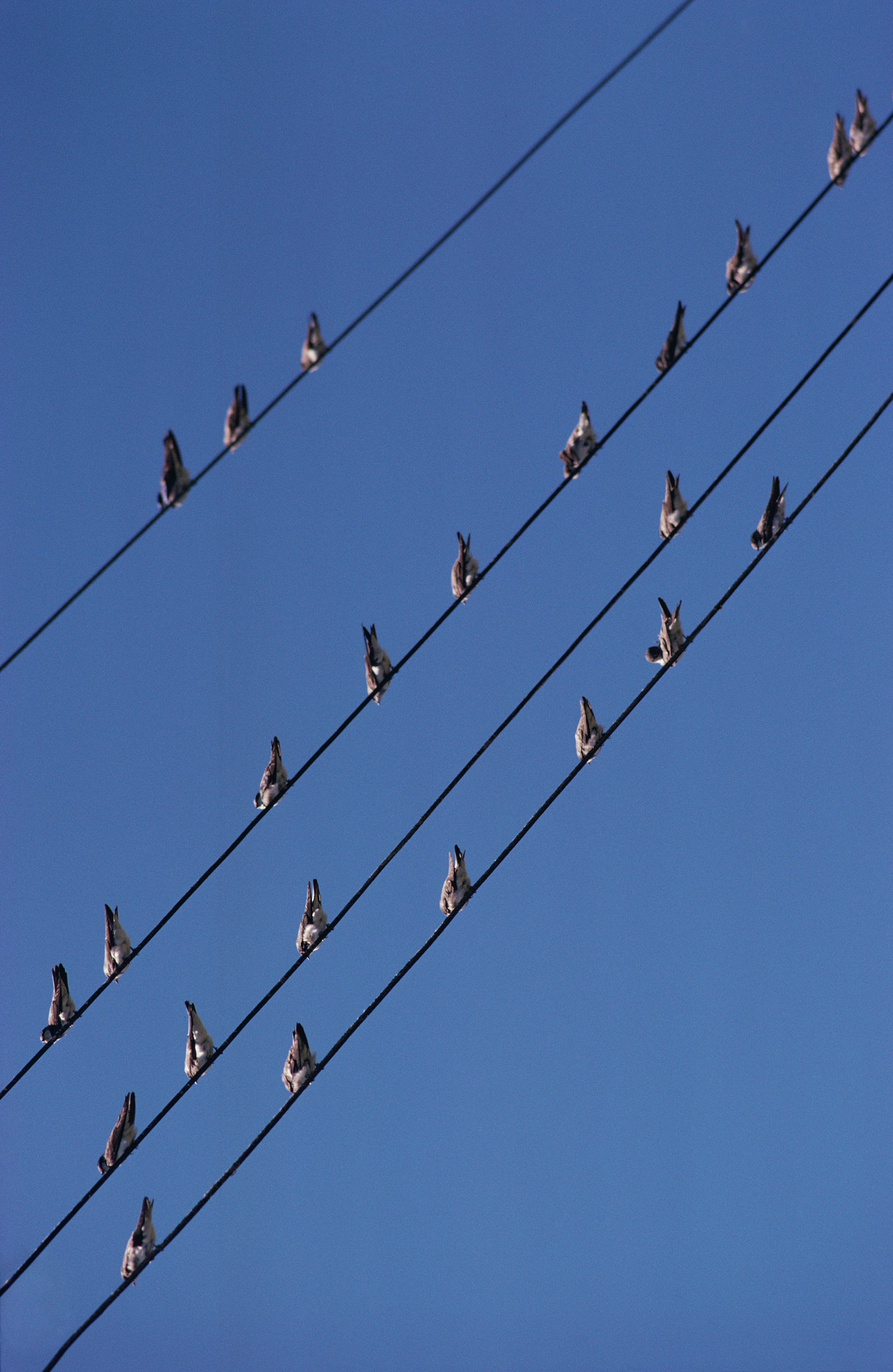| ♪ The Power of Music ♪ Music appears to be ubiquitous in the human world. People everywhere sing, play instruments and dance. And this has been true since early humans on Earth. Musical instruments have been found in archaeological digs all around the world. Music accompanies us in our solitude. In days gone by, , men (rarely women, I think) would walk down the street whistling. Today, one cannot walk down the street without hearing the blare of a boombox from a passing car or seeing a passerby focussed on the music in their earbuds to the exclusion of the outside world.And how many people have music playing while they work? Music accompanies our social lives. Jazz background music in a café, going to a concert with friends, even jam sessions or sing-alongs with like-minded people. Music is the language of love. How many songs have been written to love, both in joy and in heartbreak. Ask anyone about love songs and they will begin singing their favorite song. Music is ubiquitous. It is featured at weddings, birthdays, funerals, at just about any special event. It is soothing. Lullabies put many a baby to sleep. It is solace. For any heartbreak, loneliness, sorrow, there has been at least one song written. It is joy. When happy, we spontaneously break into song. It is togetherness. All leaders know that a rousing song will bring the troops together, whether it be a protest song, a patriotic march, or a rowdy drinking song. Music is featured in schools (though not nearly enough anymore in this writer’s opinion) and in churches. Music is of all types: catchy ditties, folk songs , Lieder, chorales, dance music from minuet to the Bunny Hop, sonatas, symphonies, operatic arias, masses and oratorios. It is for babies, children, adults and ancients alike. It is a way to bring generations and cultures together. Music is eminently memorable. Advertisers know and exploit this. Ask anyone from age three to eighty about an ad about some common product from their childhood and they will be able to sing the jingle from that ad. Ditto with a television show’s theme song. Or a popular song from a movie or musical. Music pervades our lives and makes them much richer for it. How dull would be a life and a world with no music! Luckily, we will always have our voices and thus music will accompany us wherever and whenever we are. -MW ♩ ♩ ♩ ♩ ♩ ♩ ♩ ♩ ♩ ♩ ♩ ♩ ♩. ♪ ♩ :] | Music What is music but sound that is the panacea of panaceas, the opiate of opiates, the analgesic of analgesics, the attraction of attractions, the purgative of purgatives, the aphrodisiac of aphrodisiacs, the gift of gifts, the food of foods, our timeless and universal elixir! Creativity Traditionally, creativity was commonly deemed a wondrous God-given gift or but a chance unique talent. These yesteryear assumptions prevailed until the advent of modern-day psychology. With Freud, attention began to shift from these suspect sources of creativity to the very complex psychology of creativity. The road from creative potentiality to the creative process now became progressively more intricately psychological. Creative potentiality, necessary intelligence and imagination can vary dramatically from person to person. A modicum of inherent possibility to create demands a good deal of effort for fruition, an abundance correspondingly less. To wit, some trying honing--sweat and grief--is always necessary if potentiality is to become a creative skill. Creative potential would lie fallow but for some compelling motivation. Need and want seem to be the major motivating thrust in every kind of creativity; a need to counter the pain of wanting self-esteem and/or the low regard of others. Creativity can therefore serve multiple purposes and can be twice rewarding: a blessing for the creator and a gratuitous gift for the public. Creativity is thus essentially a catharsis, a wondrous therapeutic exercise, and this is true both of the genial and of the run-of-the-mill creators. Unfortunately, most blighted and blessed creative individuals are compelled to return to the well again and again, for the psychological benefits of creativity are more or less short-lived. The creative process itself is no pleasant saunter in a groomed grove, but an arduous crawl through taxing jungle thickets: torment that may end with a blissful heurēka. -JM |
| An die Musik Du holde Kunst, in wieviel grauen Stunden, Wo mich des Lebens wilder Kreis umstrickt, Hast du mein Herz zu warmer Lieb entzunden, Hast mich in eine beßre Welt entrückt, In eine beßre Welt entrückt! Oft hat ein Seufzer, deiner Harf entflossen, Ein süßer, heiliger Akkord von dir Den Himmel beßrer Zeiten mir erschlossen, Du holde Kunst, ich danke dir dafür, Du holde Kunst, ich danke dir dafür! | To Music You, noble Art, in how many grey hours, When life's wild circle entangles me, Have you kindled my heart to warm love, Have you transported me into a better world, Transported into a better world! Often has a sigh flowing out from your harp, A sweet, divine harmony from you Unlocked to me the heaven of better times, You, noble Art, I thank you for it, You, noble Art, I thank you! |
The power of music is apparent in nursing homes. I have not seen any activity that arouses all residents, from lively, active ones to dozing, half-aware ones, so much. At my mother's nursing home, a music therapist came one a week. One new man, who appeared to be non-English speaking, sat dully until the music teacher brought him a drum. After that, he smiled and entusiastically played the drum. Another French woman who sat without speaking suddenly began singing when she heard a song she knew. I could just mention the Marseillaise and she would belt it out. And here is a video of my mother not long before she died, enjoying the music, one of her last pleasures in life.
Some birds, among them song birds, have an amazing ability to sing. They have a syrinx composed of two membranes that can vibrate rapidly and separately, thus allowing a bird to sing a duet with itself. Without modern technology. They also have the ability, along with whales, dolphins, bats and humans, to learn song/ language from others. And they can sing as many as thirty-six notes per second. Molto allegro.
The chick learns much as a human child does. First it produces imperfect sounds, trying to imitate its parent (usually the father). As it practices, it learns and refines its song. Then it begins to imitate the sounds around it. As it does so, its brain develops more neurons. It is learning. It practices and plays with song, self-correcting. Mockingbirds, of course, are masters at this. Listening to a mockingbird, one can hear various local bird songs, as well as car alarms and cell phones. A mockingbird may imitate as many as two hundred different songs.
Birds use chirps and other sounds to communicate. The crow has many different calls. But it doesn't sing. The drive to sing may come from the dopamine and opioids produced when singing. But the best song emerges when a female is around. This is when the male bird lets loose with his own composed love song.
Which begs some questions: Do females sing as well? Why do female humans sing? Did early man sing and play instruments and not the females? And did humans learn to sing from listening to birds? A fascinating topic.
But while pondering these questions, open your window and listen to the mockingbird, just breathing in the song, sharing in the pure joy of song.
Information gathered from The Genius of Birds by Jennifer Ackerman, a delightful read.


